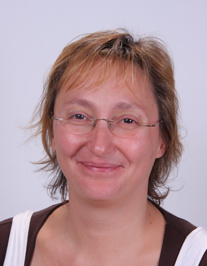
Towards the Recognition of
Non-discrimination Principles at School
-
 Case Studies
60 case studies identified through Europe focusing on intercultural issues, integration, non-discrimination values and human rights at school
Case Studies
60 case studies identified through Europe focusing on intercultural issues, integration, non-discrimination values and human rights at school
-
 Best Practices
12 best practices have been identified throughout Europe on intercultural competences and human rights at school
Best Practices
12 best practices have been identified throughout Europe on intercultural competences and human rights at school
-
 Reports
6 reports presenting the main findings related to the survey on human rights and intercultural issues carried out in the partners' countries
Reports
6 reports presenting the main findings related to the survey on human rights and intercultural issues carried out in the partners' countries
-
 Factual Background
Guidelines on the challenges encountered by secondary school teachers in managing multicultural classes
Factual Background
Guidelines on the challenges encountered by secondary school teachers in managing multicultural classes
-
 Teachers in a Multicultural Environment
Guidelines on improving teachers’ skills in dealing with multicultural environments
Teachers in a Multicultural Environment
Guidelines on improving teachers’ skills in dealing with multicultural environments
-
 Teachers for an Inclusive School
Guidelines on the acquisition of intercultural competences based on understanding human rights and non-discrimination values
Teachers for an Inclusive School
Guidelines on the acquisition of intercultural competences based on understanding human rights and non-discrimination values
Events
The I Have Rights project has been promoted trough conferences and articles.
-
 Conferences
The I Have Rights project was presented in a number of events in order to report about the activities carried out and the results achieved
Conferences
The I Have Rights project was presented in a number of events in order to report about the activities carried out and the results achieved
-
 Training Activity
The training activity 'Expert in Multicultural School Environment' was organised in Siena (IT)
Training Activity
The training activity 'Expert in Multicultural School Environment' was organised in Siena (IT)
-
 Press Review
The I Have Rights project partnership made contacts with web sites focusing on the fields of education
Press Review
The I Have Rights project partnership made contacts with web sites focusing on the fields of education
Partnership
-
 Contractual Partners
From this section it is possible to access to a description of each contractual partner of the I Have Rights project.
Contractual Partners
From this section it is possible to access to a description of each contractual partner of the I Have Rights project.
-
 Schools
From this section it is possible to access to the information about the schools involved in the I Have Rights Project in the 6 European countries involved.
Schools
From this section it is possible to access to the information about the schools involved in the I Have Rights Project in the 6 European countries involved.
-
 Associated Partners
As a result of the exploitation activity a number of associated partners officially joined the project in order to contribute to the improvement of the project impact on their target groups and to ensure the project sustainability by continuing using the project deliverables in the next years.
Associated Partners
As a result of the exploitation activity a number of associated partners officially joined the project in order to contribute to the improvement of the project impact on their target groups and to ensure the project sustainability by continuing using the project deliverables in the next years.
This section of the I Have Rights portal provides administrative information for the project contractual partners and for the European Commission and it is password protected.
Case Studies
Homepage > CaseStudies > Case Studies

60 case studies have been identified. The case studies focus on intercultural issues, integration, non-discrimination values and human rights at school.
Meeting with a Former Deportee and Education Against Antisemitism
TEACHER INFORMATION

 Name of the teacher
Name of the teacher Email:
Email: Country:
Country: Subject taught:
Subject taught: Years of experience:
Years of experience:SCHOOL INFORMATION
 Name of the School:
Name of the School: School Typology:
School Typology: Country:
Country: City:
City: Web site:
Web site:CASE STUDY
 Background and Context:
Background and Context:The students have access to a High School Life Council, European mobility projects (including Erasmus), 7 different sport activities, and 5 cultural activities (fine arts, cinema, music, drama...)
The school implements the ULIS programme (Local Unit for Inclusive Education), which helps students with reading disorders and cognitive disabilities of various kinds. In the vocational secondary school, this programme allows disabled students to attend the numerous vocational trainings.
Finally, an association called "Humanit'aide" organizes international solidarity projects.
There is no specific data on the number of immigrant students in the school or in the classes involved in this project. However, it may be noted that Saint Denis is a city of a very cosmopolitan nature: persons of immigrant background make up 36,5% of its total population (6,2% were born in Europe and 30,3% were born outside Europe), according to data from the National Institute of Statistics and Economical Studies (2011). 70% of youth under 18 had an immigrant background (at least one of their parents was an immigrant), with a majority of them of North African, Sub-Saharan or Turkish origin, according to data from the French Institute for Demographic Studies (2005).
The poverty rate in Saint Denis is 36,7% compared to 14% for Metropolitan France (based on a threshold of 60% of the median income); and the unenmployment rate of people from 15 to 64 is 23,4% compared to 13,6% for Metropolitan France, according to data from the National Institute of Statistics and Economical Studies (2013).
 Factual Description:
Factual Description:On April 14th 2016, 300 students were able to meet Mrs. Frania Eisenbach Haverland, aged 90, who survived deportation during World War II, received the Legion of Honour and wrote "Tant que je vivrai : Tarnow, Plaszow, Birkenau et autres lieux" (2007) ("As Long As I Shall Live: Tarnow, Plaszow, Birkenau and Other Places").
It was Mrs. Eisenbach's second visit to the school. She had first met two Troisième classes before, one of which was a Troisième PAC class (class with an Artistic and Cultural Project) in order to prepare an entry for the National Resistance and Deportation Contest. This French educational contest draws on the teaching of History and collective memory to ensure that the history of the resistance and the deportation is well remembered by the younger generations. Therefore, it can be considered part of the Citizenship Education.
The students produced a number of works on World War II and the topic of antisemitism.
 Activities carried out:
Activities carried out:The students produced texts, poems and drawings inspired by Mrs. Eisenbach's story and their own feelings.
With the help of their documentation teacher, they created a digital book entitled "Pensées pour Frania" ("Thoughts for Frania") about this experience. This book shows their work along with photographs and audio clips from the meeting. The students also included their personal messages to Mrs. Eisenbach.
The digital book can be seen here: http://www.jeanbaptistedelasalle.com/wp-content/uploads/frania/index.html
Their best works were exhibited in the school library.
Still related to their work on antisemitism, the students of the Troisième PAC class worked on the exhibition "Résister par l'art et la littérature" ("Resisting Through Art and Literature") lent by the Mémorial de la Shoah, the holocaust museum in Paris; with writer Christophe Lambert, they created a Prezi presentation, comic strips and a puppets' play based on his novel "Lever de rideau sur Terezin" (2015) ("The Curtain Rises on Terezin") whose main character is a Jewish playwright later arrested and deported.
They also wrote and recorded a song in a studio for the National Resistance and Deportation Contest.
Finally, they met a researcher to talk about the puppets' play "On a besoin d'un fantôme" ("We Need a Ghost") written by a 14-year-old teenager assassinated by the Nazis shortly before the Liberation.
The video of their work for the National Resistance and Deportation Contest can be viewed here: https://www.youtube.com/watch?v=f69cyvC2fHA
 Assessment and lesson learnt:
Assessment and lesson learnt:Their were very receptive to her story and expressed the compassion and empathy that they felt while listening to her testimony. Many of them said they were inspired by her strength and courage.
Several students compared today's difficult situations with some that happened during Mrs. Eisenbach's time, showing their awareness of the dangers that discriminatory ideologies still constitute, and they maintained that they were lucky to be living in a country now at peace.
 Description of the Case Study in National Language:
Description of the Case Study in National Language: